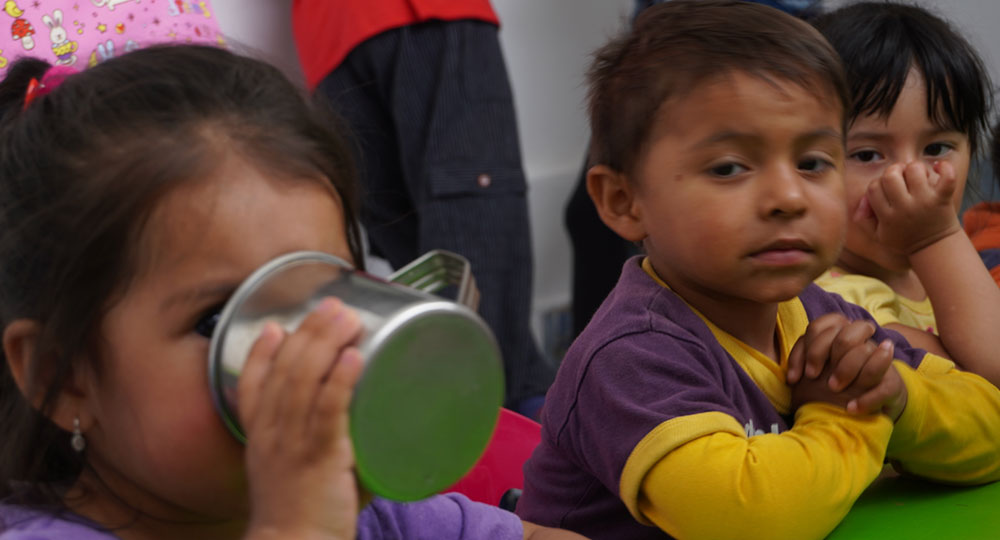More than a decade ago we opened a small door where laughter and hugs became our daily food, where hopes were intact, at least that's what we believed. A door that led us to a magical and charming place, but at the same time, full of difficult conditions.
That place is our community day-care centers that serve 507 children from 1 to 3 years of age in the city of Quito, who come from low-income families, some of them below the poverty line.
The Reality of Sara and Anahi
The situation for them is not at all favorable, they live in a ravine a few meters from a polluted river that carries sewage from the city. Their home is barely four walls and a leaking zinc roof, but this is not the biggest problem they have to face, every day Eliza (mother) has to go out looking for some kind of informal work to be able to collect a few cents and bring food home. Earning $3 to $5 a day is a blessing for her.
What nobody knows is the reality that Eliza goes through, she was sexually abused at the age of 15, as a result of this event, she became pregnant with her eldest son. Eliza did not have access to education because her parents did not support her when they found out this happened and in deep states of depression she has had to raise her two girls and learn to love her first child.
She gets up at 4:00 AM. To prepare a small ball of flour for each member of her family and a cup of coffee, dress her children and send them to education centers with the dream of going out into the streets and finding something to sell on that day. She currently earns an average monthly income of $65 with which she has to support her three children.
Anahi and Sara attend one of our children's centers Monday through Friday, where they receive education, love from our educators, and food. Along with the support of volunteers and making great efforts for lack of donations, we have managed to gather some food so that this family can eat during the weekend, because we know that there is still hope for them.
The future for them is difficult to predict due to the circumstances in which they live. The Children's Centers are located in very poor and peripheral places of the city, where the index of insecurity is high, affected by delinquency, alcoholism, drug addiction, prostitution, lack of employment and education mainly. This has influenced family environments to disintegrate and children are exposed to parental abandonment, domestic violence, malnutrition, psychological mistreatment and in some cases sexual abuse.
Each child care center accommodates approximately 50 children living in similar circumstances.
SOME FACTS
- 16% are suffering chronic malnutrition and 30% malnutrition within their homes.
- 60% of children show signs of physical and emotional violence within their families.
- 43% of the families are monoparental, where the mother has 2 to 3 children and earn between $30 and $100 per month.
- 48% of the families do not have a regular job.
- Some children do not have adequate personal hygiene controls in their homes, and the day care center does not have the resources to purchase personal hygiene materials to help in this area.
- There is no government intervention by social workers or psychologists to determine the true degree of vulnerability that families face.
- The day-care centres have poor infrastructures and there is no adequate psychomotor development in the children due to a lack of didactic materials.
- Electricity and drinking water systems are in poor condition.
- Bathrooms are in poor condition and not adapted for children.
- The government only supports with food for the children from Monday to Friday and the payment to the educators, but does not finance or contribute to the improvement of the infrastructure.
Now that we have crossed that door and seen the realities of children, families and child centers, we can say that it was worth it, that the hopes are still intact if we act together to lift up the future of many children like Sara and Anahi and their homes.
Each year we have the goal of integrally strengthening a day care center and we still have a lot of work to do. It is easy to get to know these realities, the hardest thing is to understand them and hold them in time, and that is our mission.
¿HOW YOU CAN HELP?
Donate now and help us tu support this cause to:
- Buy food for the children of the poorest families on weekends.
- Buy didactic material (play-dooh, puzzles, logic games, threading, cardboard, crayons, watercolors, colored pencils, etc).
- Equip with computers or tablets for the work of the educators.
- Buy cleaning material
- Buy personal hygiene products for the children and families who attend our health campaigns.
- Acquire furniture for Children's Centres (baby chairs, mattresses, tables and chairs for children from 0 to 3 years old, shelves, set of toys for recreational spaces, etc.).
- Cover costs of mobilization of volunteers, social workers, psychologists and nutritionists.
- Acquire security systems for childcare centers
- Buy playground equipment
- Buy uniforms for children and educators





